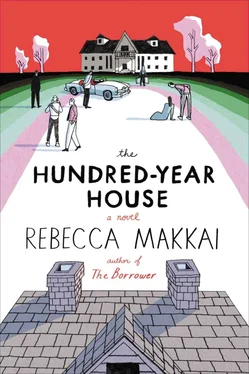That ridiculous cup of coffee, that flimsy prop. When it was obvious to everyone — humiliatingly, glaringly — that even in the midst of her crisis, her husband dying , Gracie had felt the need to drag Doug aside and upbraid him for his brazenness, for staying behind with Miriam to wait for midnight, to kiss her at midnight, to be with her alone in case the world ended, to leave Zee an abandoned fool at the end of the world. When Zee and Case had met her in the ER, Gracie had grabbed her arm so frantically, asking where was Doug, and Zee saw that she knew . No one could hide anything from her mother.
They went into the room, first Gracie and then Case and then all of them, and there was Bruce, still so pink, so sweaty, the hairs in his nostrils still wet, his fat hands resting so lightly on the sheet, that he couldn’t possibly be dead. They should have waited an hour, till he was bluer and smaller.
The nurse said, “There’s been a whole lot of heart attacks, the last few days. A lot of stress right now.” As if it were all the rage.
Case, behind Zee, said quietly: “This is my fault.” Zee turned and saw that Miriam was over near Doug — of course — and he must have been saying it just to her, to Zee.
She whispered back: “That’s not true, Case.”
“You know it is. I’m a lightning rod. I told you.”
She pulled him away from the bed. The others were talking to the nurse. She said, “Case, I used to hate you, I really did, with your little car and your haircut, but — you didn’t do it. It’s not your fault.” She should have stopped there. She didn’t. “You just need to get away from that house. I mean, especially now. Why stay?”
Zee was asking herself as much as she was asking him, but he was the one who turned and crutched his way out of the room. She didn’t follow.
Gracie leaned over the bedrail, gazed at Bruce’s face with her blue eyes huge and dull, but she didn’t make any noise. When Zee’s father died, Gracie had folded up like a clever piece of origami, right in a hallway of this same hospital, and Zee stood there, twelve years old, stroking her mother’s hair and waiting to feel something more violent, more physical, herself.
She marveled at the difference in Gracie’s reactions, at her stolidity now, her asking the nurses what she needed to sign and how soon the body would be moved. But of course Zee’s father had been her first love, and they’d been so deeply in love. And his illness had been drawn out— protracted was the word — and he’d been in pain for months, his body weakened by those early years of heavy drinking, his liver and spleen finally both giving way.
Her father was a good man, maybe the only good man she ever knew. He was gentle and quiet, and in third grade when her friend Ellen said he was just like Mr. Rogers, only smaller, Zee said, “You’re totally right!” and wasn’t offended at all.
He took her to the Art Institute and showed her the hidden woman behind Picasso’s blue guitarist. He taught her to handle books like precious objects, never to dog-ear. He told her long, fantastic stories, and if she sat in his lap she could sometimes hear a coin clinking against his teeth.
What would he make of her life? He’d be proud of her work, she was certain, proud of her commitment to dissecting power structures and money and class. He who had vetoed the Chippeway Club. The grounds crew and maids he hired (of necessity, or the house would fall apart) were always starving artists who did a terrible job for which he overpaid them. He’d be sad at the spiral she was in. And he’d be disappointed that she’d abandoned her name. By twelve, the burden of the nickname Godzilla became too much, and so after his death she reduced herself to the sound of a single letter. He had named her, and she had lost her name, and for some reason this made her sadder than anything else. He had loved that house, and she had tried to come home, but it was destroying her. She began sobbing. She went for a walk through the halls.
When she came back, there were Doug and Miriam and Case in a little triangle. Miriam was saying, “You need to lie down. Why don’t I drive you home?”
“Just dizzy,” Case said. “I’m not tired.” He looked up and saw Zee. His eyes were flat little plates that reflected no light at all.
Doug said, “Case, sit down. You’re going to pass out.”
He didn’t move.
“You look terrible,” Doug said.
Case didn’t even look at him, just kept staring at Zee. She ought to have said something reassuring about the laws of the universe, about cause and effect. (The things she wasn’t sure she believed in anymore.) But Doug kept talking.
He said, “I’ll drive you.”
Case said, “No, man, I’m good.” Then he looked at Miriam, a terrible look, and said, “You can have it, Mir.”
Miriam sat on the floor and put her head in her hands. Her shoulders started moving up and down.
Doug said, “What? She can have what?”
Case walked right past Doug, right past Zee, and out of the hospital.
In the big window at the end of the corridor, the sun was coming up on the twenty-first century. New nurses were starting the morning shift.
Though Case came back to town for the funeral and posted himself next to Miriam in the church, he wasn’t staying in the coach house. Doug was reminded of Hamlet, skulking back to the graveside before heading into more tragedy. Doug didn’t understand what had happened that night at the hospital, or the next day, when Miriam shut herself in the sunporch and Case packed things into duffel bags and headed off in a cab. He worried it was his fault, that something he’d said in the hospital hallway — what had he even said? — had broken their marriage in two.
Zee implied there was more to it, that she’d seen this coming. But Zee was always seeing things he wasn’t.
Miriam moved slowly in the next weeks, fragile and unfocused — but she didn’t have that wild look of someone who’s reliving a shock again and again. Whatever it was that had gone bad, she’d already figured it out ages back. There were purple circles under her eyes, but Doug never heard her crying.
She worked only occasionally on the kitchen mosaic they’d come to call the Happensack, and spent most of her time on a series of Gothic mansions, cross-sectioned like dollhouses. She used bigger scraps and tiles, creating flaps that lifted to show secret rooms beneath. Sometimes there would be a second, smaller door behind the first. One piece was based on Jane Eyre : a mad face painted on a button, peering from an attic window. Another was The Secret Garden , another was Rebecca , and a fourth was Laurelfield itself, the big house and coach house, built from symbols of luck both good and bad: clovers, acorns, rabbit’s foot keychains, broken mirrors, pennies, toy ladders, and — most disturbingly to Doug — hundreds of ladybugs she’d swept from the floor, their faded bodies forming the borders between the rooms.
Doug cooked dinner for all three of them every night, and Zee would take her pasta or soup back to her desk. She wasn’t comfortable with grief. Doug ate with Miriam at the kitchen table, and when they talked it was about music or celebrities or Seinfeld .
They watched Bluebeard again together, and she pointed out the scenes where Marceline Horn looked sick. They paused the movie to study her face, then fast-forwarded. At double speed, the two sisters ran to the tower to lock themselves away from Bluebeard. At double speed, Bluebeard beat down the door.
—
Both Gracie’s story and the subject of the colony files had been put on ice for now. Nor could Doug claim the attic key yet. Gracie was barraged with a stream of visitors and fruit baskets and hadn’t emerged much from the big house. And to bring up the story with Miriam would be to bring up New Year’s Eve, the night that her world did, after all, come to a halt, even as the rest of the planet kept spinning. Doug promised Leland he’d fill him in when things settled, when he had time to digest the bizarre changes of fortune that had befallen everyone in the house. Everyone but Zee, really. She was the only one whose life wasn’t massively altered for better or worse. But Zee had always been above the sways of fortune.
Читать дальше












